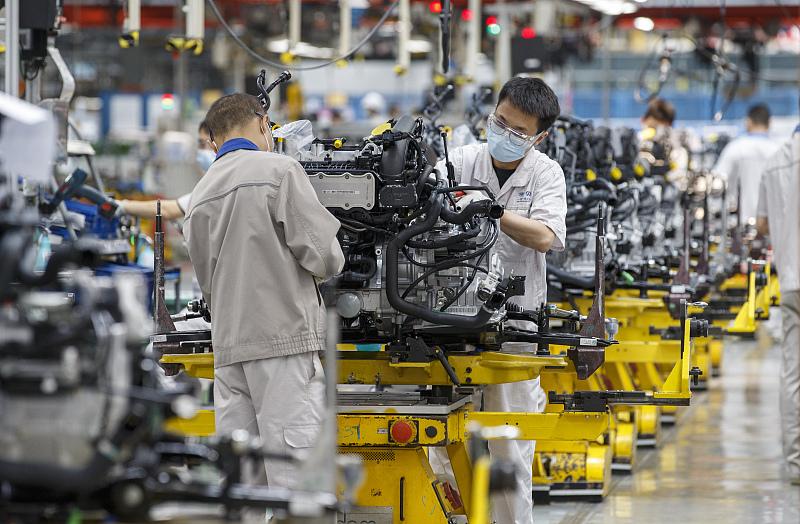Prudence dominates China's investment, consumption measures
- By Hannan R. Hussain
 0 Comment(s)
0 Comment(s) Print
Print E-mail China.org.cn, February 2, 2023
E-mail China.org.cn, February 2, 2023

Employees work on an assembly line at the FAW-Volkswagen factory in Chengdu, Sichuan province, in December 2022. [Photo/cfp.cn]
The Chinese government has recently announced plans to boost consumption and implement a host of foreign investment stability measures to propel the world's second-largest economy to new heights. Both areas of focus can play a meaningful role in consolidating the momentum of China's economic rebound early in the year. After all, resilient and stable economic growth has been a major theme of China's shrewd policy planning so far, and has earned the country a prominent position in global growth forecasts early in the year. Further prudence is thus an exercise in expanding growth and sends a powerful message to major trading partners that opportunities for cooperation are significant. Chinese Premier Li Keqiang said at a recent State Council executive meeting that boosting consumption is a crucial step for expanding domestic demand, emphasizing the importance of restoring the structural role of consumption in the economy.
Beijing's approach to optimizing its economic performance through key foreign trade and consumption metrics considers several core advantages. It arrives with a domestically viable focus on employment and price stability to improve the growth environment overall, and is complete with a proactive determination to implement the important decisions of the Central Economic Work Conference.
By planning to accelerate consumption early this year, consumption itself could emerge as the main driving force for China's economy. After all, consumption of in-person services has seen a noticeable recovery already, paving the way for more robust policy support on key fronts. That includes policies that support consumer service businesses in China, as well as "big-ticket items" across major service industries. The sheer amount of industries drawn into the State Council's consumption-focused growth plan merits optimism for economic recovery and can help offset volatile demand.
As a country home to 1.4 billion people, consumption's structural role in growth acceleration cannot be overstated. Think of it this way: the more consumer service businesses, self-employed individuals and big-ticket industries that China's consumption policies touch, the stronger the impetus for expanding domestic demand. Most Chinese provinces are already operating on that logic as they target 5-6% GDP growth rates and embrace consumption as a key foundation for a rebound. Here, Beijing promotes active growth and resilience at the local level, throwing its weight behind local governments to attract businesses and investment, creating fertile ground for foreign enterprises. Above all, this is a step in the right direction for Beijing to "fully leverage" its competitive advantages from the ground up and create a melting pot for foreign investment opportunities this year.
In addition to spurring foreign trade and investment, periods of recent progress have seen China's fiscal and monetary policies closely align. This is important as such alignment is now at the heart of China's robust recovery prospects this year. Therefore, measures such as upgrading China's new catalog of foreign investment industries stand to be complimented by a stronger role for pilot free trade zones and other platforms.
It is worth noting that such active efforts on the foreign investment front have supported prospective investments on Chinese shores in the past. Add to that Beijing's redoubled support for state-owned and private companies, and there is an all-out effort to optimize contributions to China's growth acceleration.
A recent U.N. report demonstrates the value of China's growth stability to the world. This year, it anticipates China's GDP growth will accelerate to 4.8%, a valuable consideration given that world output growth is expected to dwindle below 2%. "We must fully leverage our competitive advantages, improve our business environment, and stabilize foreign trade and investment by opening wider to the world," Li said recently. His words signify that the country will continue to stick to its opening-up policy, which is both conducive to its early-year economic stability and beneficial to the global economy.
Ultimately, Beijing's resolute measures to boost consumption, streamline foreign trade and consolidate China's economic rebound are wide-ranging and timely in equal measure. They support overall growth domestically and many of China's industrial provinces are already ramping up production. At the same time, there is no room for complacency in boosting China's consumption to the advantage of its own economy. This determination is likely to yield many more growth dividends going forward.
Hannan R. Hussain is a foreign affairs commentator, author and recipient of the Fulbright Award.
Opinion articles reflect the views of their authors, not necessarily those of China.org.cn.
If you would like to contribute, please contact us at opinion@china.org.cn.





